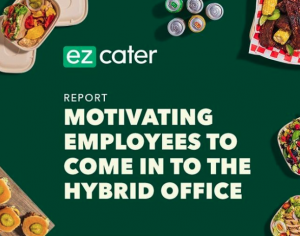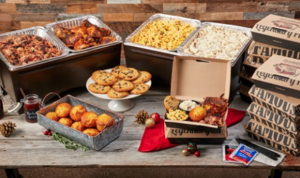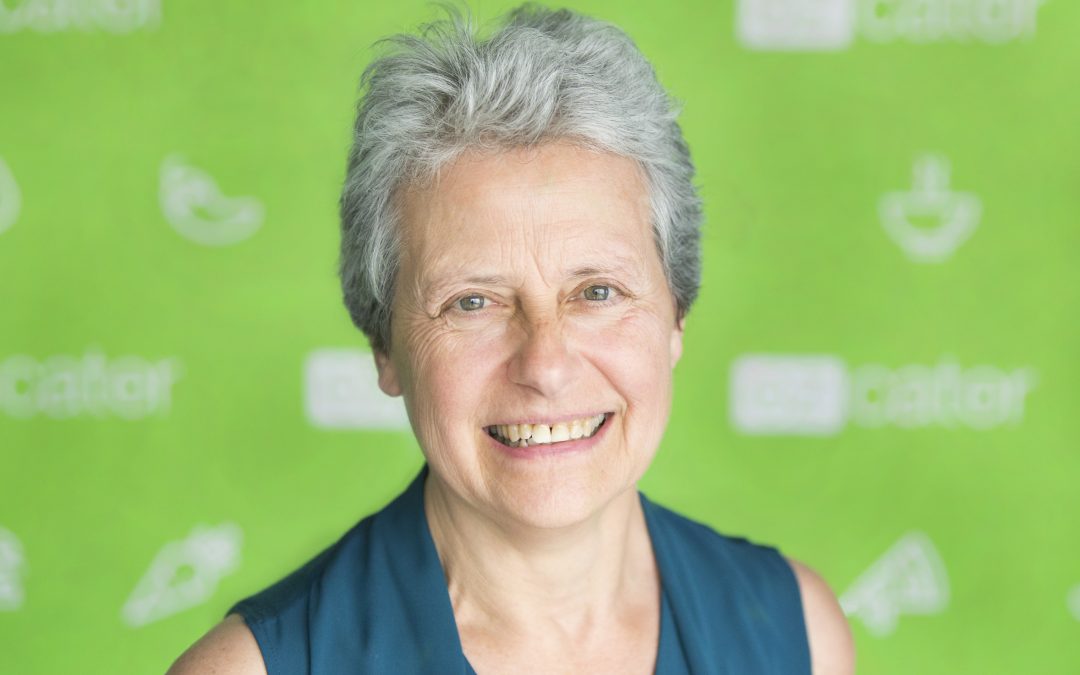ezCater closed out 2021 with a $100-million investment that might seem unexpected as omicron axes return-to-office plans across the globe. By focusing on jobs that have to be done inside the workplace, shrinking its own headcount and debuting a marketing campaign focused on brand awareness, the workplace meal provider is back to pre-pandemic volumes, more efficient than before, planning an eventual IPO and quite proud of its $1.6 billion valuation.
For a co-founder and CEO, Stefania Mallett was uncommonly direct in describing what the pandemic wrought for the company that was still basking in the afterglow of recent $100 and $150 million investments when COVID-19 appeared. In those still-heady days, ezCater had just acquired GoCater and Monkey Group, moved into a nearly 100,000 square-foot headquarters in downtown Boston and was staffing up in anticipation of a huge 2020. Then, of course, everything changed.
Two years later, the company’s fortunes have returned to those salad days even though central business districts across the globe—especially in top-tier cities—remain relative ghost towns with no concrete return to normalcy in sight.
 Asked what pulled the company out of its “deep, deep trough,” and seduced SoftBank to join its panel of investors, Mallett pointed to a changes in the kinds of jobs and workers its sales team targets, a new product designed for hybrid work situations, shrinking its own headcount and an expensive national ad buy focused on brand awareness, rather than its previous strategy of finding workplace meal buyers at their “moment of intent.”
Asked what pulled the company out of its “deep, deep trough,” and seduced SoftBank to join its panel of investors, Mallett pointed to a changes in the kinds of jobs and workers its sales team targets, a new product designed for hybrid work situations, shrinking its own headcount and an expensive national ad buy focused on brand awareness, rather than its previous strategy of finding workplace meal buyers at their “moment of intent.”
“We didn’t know until COVID exposed it what a large percentage of our audience pre-COVID of the people who order food through us were people whose jobs could be done at home,” Mallett said. “What we figured out pretty quickly was to go after the jobs that have to be done in the workplace and that helped keep our restaurants alive, because they were bringing food into new locations for them—and it helped keep us alive.”
She cited examples like bakeries or manufacturers where workers weren’t able to grab their laptops and decamp for home offices that have formed ezCater’s COVID-era backbone and kept its restaurant partners humming.
Taking a page from the Foodsby business model back in 2020, ezCater also launched its Relish service that it called “a new way to feed offices of any size” through individually packaged meals delivered in a single delivery drop at a designated time and place.
“We have all those sectors, segments [and] verticals that we moved into, we still carry them forward with us, so we’re in a stronger position from a market perspective,” she added.
Turning toward the investment, Mallett was clearly excited about the company’s higher valuation, calling it a “real meaningful up round” and said the company has “never been as well capitalized at the time that we did a raise.”
SoftBank’s Vision Fund 2 led the round, which brought ezCater’s total funding to $425 million, and certainly raises the company’s profile into the massive tech investor’s elite ranks including DoorDash, Nextbite (formerly Ordermark), Nuro and Uber Eats.
Angela Du, at SoftBank Investment Advisers, said, “We believe ezCater has established the perfect product/market fit, with its deep expertise and its purpose-built corporate foodtech platform. We’re excited to help ezCater extend its lead in this massive and fast-growing segment.”
Mallett said she expects SoftBank to be “terrifically valuable” and “just as grand” as the company’s other leaders. “It’s adding another very informed, very smart voice to our chorus,” she added.
 At present, ezCater doesn’t have any specific acquisitions in mind, but some of the latest investment will be used to continue its new marketing campaign, including a significant ad buy with National Public Radio.
At present, ezCater doesn’t have any specific acquisitions in mind, but some of the latest investment will be used to continue its new marketing campaign, including a significant ad buy with National Public Radio.
“We’re now expanding into educating the business customer about our existence so that, at some point in the future when they come to understand they need to order food, they think of us and brand awareness is an education process that’s expensive, but yields a lot of dividends down the road and we’re seeing the early benefits of it,” Mallett said.
While the IPO market has cooled off in recent months, ezCater is actively pursuing a public offering, most likely sometime in 2023. Mallett said the company is willing to take the downsides, like more rigorous oversight, for the upsides of visibility and additional fundraising when the time is right.
“Amazingly, we have never struggled to raise money, but going public is more than that: it’s one form of validation, it turns our stock into a currency that our employees can assess every day, and it’s a way to provide a return for our investors,” she added. “It’s also a huge marketing event. That brings in more customers, and lets us send more large orders to restaurants.”
Still ready to blow the doors off
With a unique window into the world of corporate planning, Mallett said she expects COVID to ultimately morph into a “dull roar” that we live with, we get smarter at dealing with as a society, but something that never goes away.
This pandemic coming at the exact moment where technologies like Zoom, meal delivery and other technologies have created a moment where society can reevaluate the relationship between our work and home lives—which is something she expects to continue.
 “That flexibility we’re giving each other to the extent that any job allows that, I think that’s something that society doesn’t want to let go,” Mallett said. “I don’t think humanity wants to go back to shut up, show up for this many hours in a row every day, don’t talk to me about your non-work life. I don’t think humans want to go back there, and I think it actually produces better work when you are more flexible with your employees.”
“That flexibility we’re giving each other to the extent that any job allows that, I think that’s something that society doesn’t want to let go,” Mallett said. “I don’t think humanity wants to go back to shut up, show up for this many hours in a row every day, don’t talk to me about your non-work life. I don’t think humans want to go back there, and I think it actually produces better work when you are more flexible with your employees.”
Whatever comes next, be it omicron or another variant, Mallett said “people need to make locally correct decisions for their group,” which will inevitably, ideally include food served in a safe setting.
“If you’re going to get together, then bring food, because food always helps, and by the way, you can always get food in individual packages,” she said. “Through our platform we make it very easy to find individually packaged items, and perhaps that’s the way to thread the needle.”
Asked about ezCater’s competitive landscape, which now includes companies like Sharebite with similar business models and their own sky-high valuations, Mallett said “It’s a big, big market, we welcome them, they keep us sharp” before adding with a laugh, “Eat my dust, people, we’re the biggest, we’ve been at it the longest, we know the most.”
In the meantime, she can return her focus from investors to daily operations, which still includes getting ready for a world where the pandemic is less of a focus and office tower hallways resemble what everybody expects when they picture the wheels of corporate America in motion.
“We raised money in order to be able to, the minute COVID has finally let everything go, finally gotten truly relegated into the realm of it’s just like another flu, when the world has gotten to where COVID is like that, then we can really blow the doors off,” she said.



